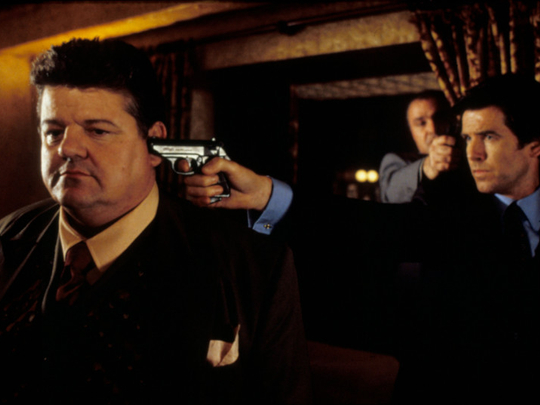
It’s slick, it’s fast-paced and it’s sexy. But that’s the cinema. Spectre, the latest James Bond thriller starring Daniel Craig, opens in UAE cinemas on November 6 and has already received critical acclaim. But is it pure fantasy? Or are there any similarities with the work of a real-life operative in Britain’s Secret Intelligence Service (SIS), better known as MI6?
I’ve gone to meet two serving SIS officers to find out. I don’t notice them at first, there are so many people in the room. Are they part of the camera crew? A couple of people sent up from hotel reception perhaps, to check we have everything we need? But then we are introduced. Kamal — and I’m going to go out on a limb here and guess that is probably not his real name — is thirtysomething, unshaven, quietly confident. Kirsty is only slightly older. Neatly dressed, she looks like she might run a medium-sized IT company. In fact, she is in recruiting, having already done the hard yards in the field overseas.
Kamal speaks first. “I’m what people would classify as an agent-runner,” he tells me. “Our job is to find individuals with access to secret intelligence of value to the UK government. My job [within MI6] is to build a relationship with these individuals and work with them to obtain the secrets they have access to, securely.”
And bang, up in smoke goes one of the biggest misnomers about espionage and spies. James Bond, and all the real-life men and women who work inside those sandstone and emerald-coloured headquarters at Vauxhall Cross on the banks of the Thames, are not “secret agents”. They are intelligence officers. The people overseas whom they persuade to spy for them are the actual agents. As an agent-runner, Kamal’s job is at the sharp end of intelligence-gathering. Put bluntly, he has to try to recruit people to do difficult and dangerous things, sometimes betraying the very organisations they have worked with for years. How, I ask him, do you do that? Is it money? Or charm? Or willpower?
“It’s a combination of all these things and a little bit more,” he says. “People have different motivations for working with the UK, but the thing that underpins them all is that they willingly enter into a relationship where they’re passing intelligence to the United Kingdom.” It all sounds, to be honest, a bit other-worldly; a throwback, perhaps, to the monochrome world of John Le Carre, where people stubbed out cigarettes beneath their heel while waiting for a defector at Berlin’s Checkpoint Charlie. I wonder if, in this digital cyber age of drones and satellites and intercepts, there is still a place for the sort of old-school human spycraft Kamal is alluding to.
“The nature of the world is such that we can’t operate in isolation,” he says. “So we work very closely with MI5 [the UK’s domestic Security Service] and GCHQ [the secret listening station at Cheltenham]. It’s that combination of technical and human intelligence that allows us to answer the questions that key individuals in Whitehall want to know about.”
Such as what, for example? “It’s a variety of different threats. Traditionally, we have faced states and organisations that have sought to penetrate the heart of the UK government and key UK institutions and then steal their secrets. Those still exist, they haven’t gone away.”
Kamal does not mention Russia once, but I remember an MI5 officer telling journalists, not so long ago, that there were just as many Russian intelligence officers operating in Britain in the Noughties as there were during the Cold War in the early Eighties. “Alongside those threats,” continues Kamal, “we have the terrorist threat. We have states and organisations looking to proliferate weapons of mass destruction and nuclear technology. We have states with territorial ambitions. And, more recently, we have people looking to conduct cyber-espionage against the UK.”
So how does it work, I ask. Do you just walk in each morning, pour yourself a skinny latte, log on to your computer and then discuss what the latest threat is? That turns out to be not too far from the truth, but there is more method to it than that. Kamal explains something called “the intelligence cycle”. It works like this: the political leaders in Whitehall decide there is a requirement to find out something secret — for example (and these are my suggested examples here, not theirs), how many nuclear centrifuges Iran is operating below ground, or which routes Daesh is using to smuggle recruits into Syria. The targeting officer then works with MI5 and GCHQ to identify the individual overseas who is best placed to know the answers. Next, a “reports officer” articulates these questions to the agent-runner and tasks him or her to get the information. A whole team of people then works out how best to get the agent-runner in front of the potential informant. Some approaches fail. “Often,” admits Kamal, “the people we identify are simply unsuitable for intelligence work, for a whole host of reasons.”
But when it works and the agent starts to produce intelligence, this gets passed up the chain to the reports officer, who assesses whether it is credible. “Once they are satisfied it is, they pass it back to the individual in Whitehall who asked the question in the first place. That is the cycle.”
But what about life inside MI6? Is it not, I suggest, a tremendous psychological strain to be living a secret life that you can tell almost no one about? “When people join the organisation, they are given a cover role,” says Kirsty. “They get a number of security briefings to help them manage that cover and actually it becomes second nature. So most people may tell their nearest and dearest, but to everyone else they would live that cover story for the rest of their career.”
Could it, I venture, even sometimes be fun, pretending you are something you are not? “Absolutely” says Kamal. “It is one of the best parts of the job. It’s theatre. On occasion it allows you to engage your more flamboyant side, which of course is wonderful.” We are going off-piste here and I remember I have some more serious questions that need asking. I want to know about the danger. Bond, of course, is mysteriously invincible, apparently unhindered by mortality, no matter what threats he faces. But in real life, how dangerous is it? Kirsty chooses her words carefully. “It would be untrue for me to say that all of our work is free of danger. However, we have a team of security advisers who ensure that we and our agents are as secure as we can be. No operation would go ahead if we had any doubts about our security, or that of our agent.”
Which brings me to the whole double-O prefix thing. I am almost embarrassed to ask, but I do it anyway: is anyone in SIS (MI6) licensed to kill? “Absolutely not,” replies Kamal. “The mythology around espionage, and around SIS in particular, is extremely misleading. We are an organisation that revels in subtlety, and the methods 007 employs — crash-banging across cities in both hemispheres — is entirely misleading. We seek to operate in the shadows and we don’t like to draw attention to ourselves. Having a licence to kill is the antithesis of that.”
Yet some myths turn out to be true. The Chief is still known as “C” and is the only person allowed to sign papers in green ink. The gadgets and innovations department depicted in Bond films as “Q” branch really does exist. “I think,” says Kirsty, clearly warming to her subject, “Ian Fleming would be surprised at the technology we have in the modern-day MI6. We have brilliant technologists who can come up with some amazing devices that enable intelligence officers to do their jobs better.” Including weapons? “No. We stop short of anything that will do harm to other humans, and certainly nothing related to knives coming out of tyres and exploding pens.” And Bond? They both laugh. “I think that is where the fiction ends and the fact begins,” says Kamal. “Because we are not like Bond, we don’t have officers that seek to fulfil their missions at any cost. Our officers operate within the law… The fact we need to ensure we continue operating in the shadows means we wouldn’t dream of having anybody like Bond in our organisation. He has got all manner of personal issues, which I think would be very, very unhelpful in an organisation like ours.”












